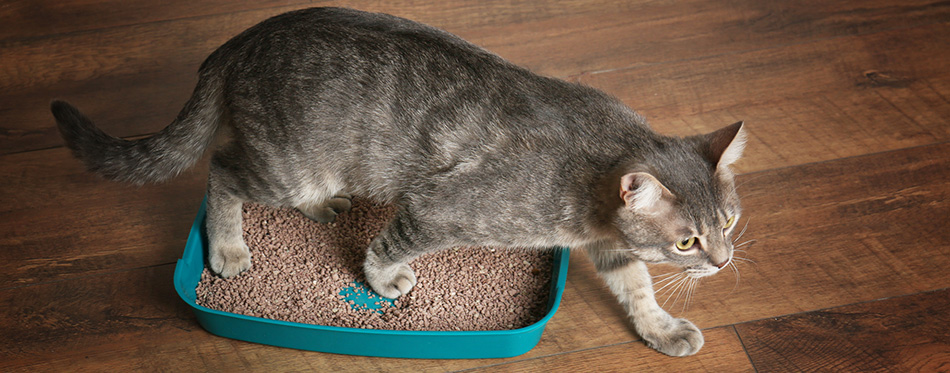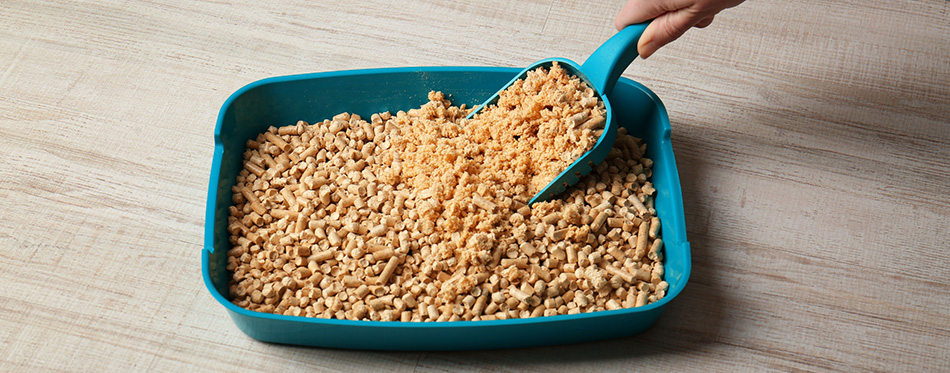A cat eating litter almost always signifies something wrong with the pet. It can be because of a nutrient deficiency or a simple manifestation of the cat’s curiosity. Take time to understand what could be causing your feline friend to start eating litter all of a sudden.

Anemia
One of the most common answers to the question ‘why is my cat eating litter?’ is the presence of anemia. This is a health condition where the blood is no longer able to carry as much oxygen as usual. All cells depend on a steady supply of oxygen for them to perform their functions.
There are different kinds of anemia. It can be secondary to a dysfunction in the production of red blood cells or an increased destruction of these oxygen-carrying cells. A more common form of anemia is iron-deficiency anemia.
Red blood cells contain hemoglobin that consists of a protein molecule and porphyrin. Porphyrin serves as the carrier molecule for iron. Each hemoglobin contains four porphyrin compounds containing four iron molecules. The iron component of hemoglobin attracts oxygen molecules in the blood. As such, each hemoglobin is capable of transporting four oxygen molecules.
Anemia occurs when there is a problem in the red blood cells. Since these cells contain oxygen-carrying hemoglobin, anemia compromises the blood’s ability to carry and deliver oxygen to the cells. A cat eating litter is trying to compensate for the loss of this oxygen-delivering ability.
Clay-based cat litter contains sufficient amounts of alkaline earths, alkali metals, and iron. There are also cat litter products that add mined clay minerals in their composition. They can also contain iron, magnesium, and sodium. Bentonite clay, for instance, contains two layers of magnesium, iron, and aluminum that sandwich a layer of silica.
Litter-eating is not the only manifestation that may suggest anemia in cats. There are others as well. These can include pale skin and mucus membranes and weakness. You may also notice your pet becoming lazier than usual. It may experience a dip in its activities because of insufficient oxygen to the cells.
Determining the presence of anemia in cats requires a visit to the veterinarian. Along with a review of the cat’s history of symptoms, the veterinarian will also subject the cat to a complete blood count. This will help determine the level of both red blood cells and hemoglobin in the cat’s blood.
Kidney Disease and Leukemia
These two health conditions can also produce anemia in cats. One of the lesser known functions of the kidneys is the stimulation of the production of red blood cells. The kidneys produce and secrete the hormone erythropoietin. This hormone stimulates the cells of the bone marrow to produce enough erythrocytes or red blood cells.
This important function of the kidney gets compromised if the organ has a problem. It may not be able to produce erythropoietin anymore. It is possible that there is still production. However, it may not be sufficient to stimulate red blood cell production by the bone marrow.
The same is true with leukemia. Most people think that leukemia is only a problem of the white blood cells. However, the main problem of leukemia is in the bone marrow. We know that the bone marrow produces most of the red blood cells. Any problem in the bone marrow can also result in a reduced production of red blood cells.
A veterinarian can help determine the presence of these two medical conditions. Urinalysis will help determine the presence of a kidney disorder. Special blood tests can help diagnose leukemia in cats. Keep in mind that cats are quite prone to feline leukemia virus infections.
Micronutrient Deficiencies
Why is my cat eating litter? It could be because of a nutrient deficiency. This is almost always secondary to poor feeding choices by the cat owner. Feeding your cat poor-quality feline food can almost always translate to nutritional deficiencies.
Examples of these nutritional imbalances in cats include deficiencies in L-carnitine, taurine, magnesium, Vitamin A, thiamine, sodium, and pyruvate kinase. Many of these micronutrients are important compositions of modern cat litter. Unfortunately, no one can explain in detail how the cat knows that the litter contains such micronutrients. Some say it is part of their remarkable ability to ‘smell’ molecules.
There are other causes of micronutrient deficiencies aside from feeding the cat with poor-quality food. Problems in the cat’s digestive system can also affect its ability to absorb these nutrients. You may be giving it high-quality cat food. Unfortunately, if the cat cannot digest and absorb these nutrients, then deficiencies can still occur.
These deficiencies can produce varying symptoms, depending on the deficient micronutrient. For example, feline Vitamin A deficiency can lead to a dull and brittle coat as well as poor skin condition. There can also be weakness and muscle deterioration. Thiamine deficiency in cats can produce weakness, circling behavior, falling, incoordination, and dilated pupils. In severe Vitamin B1 deficiency, the cat can go into seizure, prostration, and total collapse.
Veterinarians can help determine if your cat has micronutrient deficiencies. If there are, he can recommend an appropriate supplement. He can also treat an underlying cause for these deficiencies.
Find out more about Vitamins For Cats here.

Feline Curiosity
This is not at all surprising. It is quite rare to hear a cat that does not have a curious behavior, especially young kittens. They like to roam around and explore their world. It is not uncommon to see a kitten checking out its litter. They are attracted to the scent of the litter.
It is also possible for adult cats to display the same curiosity. This almost always happens when the cat owner failed to clean the litter box in a regular manner. The clumped litter can retain the odor of cat urine and feces. This can intensify the scent of the litter. The adult cat will want to check it out.
A cat eating litter can be harmless if it does not become a habit. If the behavior becomes persistent, it is prudent to bring the pet to the veterinary clinic. There might be a health or nutritional problem that needs to be addressed.
Head over to our reviews of Cat Litter Boxes and Self-Cleaning Litter Boxes for more choices.

